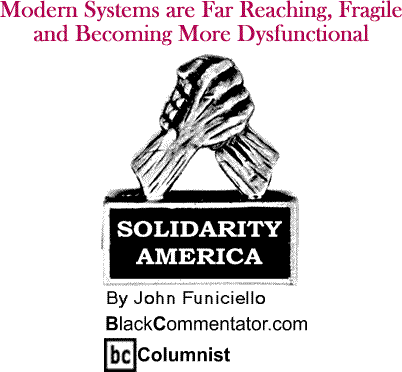
|
||||||||||||||||||||||
|
||||
 |
||||
Modern societies have reached a time when just about everything about all systems are not just interrelated, but are intertwined. A problem in one is likely to have an effect on all of the other systems.
So it�s easy to see that it might be difficult, if not impossible, for societies to act rationally when faced with the prospect of a breakdown in one system that negatively affects one or more other systems. A case in point is the recent
announcement that the longest runway at The Bay Runway is 2-� miles long and is the longest commercial runway in the world. It will be widened to accommodate today�s larger planes and it will be rebuilt with concrete instead of blacktop, to make it more durable. Anyone who has flown often likely has experienced what happens when a plane is tying up a runway at the destination airport or there is a snow squall that might last an hour. Suddenly, the dinner you had planned for that evening is cancelled and you might even have to find a nearby motel and the dinner date becomes a before-work coffee. When it can be worked out, though, you might be rerouted through another city, possibly hundreds of miles out of the way. It�s at least a distraction, if not a great annoyance. But it affects other airlines, as well as yours, and other passengers, as well. The Bay Runway reconstruction is expected to inconvenience millions of passengers over the four months. There will be fewer flights, according to the Associated Press, and therefore, airlines will be able to jack up fares. Remember, when demand is greater than the supply, prices go up.
Another fragile network is the nation�s food system. In effect, it�s an �on-time delivery� system that depends pretty much on the nation�s complex trucking apparatus, made up of thousands of transportation companies that, somehow, are coordinated to deliver the food to supermarkets and restaurants in a timely way. This system also is computerized and depends on relatively cheap fossil fuel - gasoline and diesel - to do its job. When computers go down, the company is in trouble and when fuel supplies are disrupted for any reason, the system slows down or stops. It has been reported over the decades that New York City, for example, has about a five-day supply of food at any given time, so any problems in the computer systems or any fuel supply problems had better be solved within the five days or some people are going to begin to learn what hunger is - there already are people who know hunger in that city and in other cities around the country, but this would affect people who usually have the money to buy anything they want. Then, there is the Congress
of the Democracy is fragile, at best.
What the Congress does or fails to do affects not only everyone
in Just this week, we have been witnessing an example of institutional dysfunction in the one-man filibuster by Senator Jim Bunning, a Republican (of course) from Kentucky, of the short-term bill that would, among other things, extend unemployment benefits to untold numbers of workers and keep thousands of transportation workers on the job by retaining highway funds in the $10 billion bill. Bunning insisted that he was only trying to make the Senate find money to pay for the bill and not just continue to run up the national debt. But the Kentuckian did not utter a sound about debt during the Bush Administration, which plunged the country into two wars without even a nod toward how they would be funded. They were launched on borrowed money - $1 trillion and counting - and the next two generations will have to pay for them. Now the U.S. Senate is a fragile system (as well as far-reaching), when one senator can thwart the will of the other 99 and endanger the well-being of so many American families. The dysfunction of the Senate even tops Bunning�s performance. That the rules are such that democracy is stood on its head and nothing can be done about it is intolerable. To bring together fragility
and dysfunction and
One senator, Joe Lieberman,
an independent from As a result of the dithering of Congress (and the White House comes in for its share of criticism), the health of the American people deteriorates. It�s as if the powerful, politicians and the rich of Corporate America, can�t see any problem. They can pay for their own health care, if necessary, and not miss the money, while millions are sickening and dying for lack of money to pay for their care. And, at an income of $30,000 a year, they can�t pay $1,500 a month for the premiums for family coverage. What the people who run the country don�t realize, at their peril, is that they have brought the country itself to the brink of dysfunction. They have ignored the problems for so long that they seem incapable of seeing them.
BlackCommentator.com
Columnist, John Funiciello, is a labor organizer and former union
organizer. His union work started when he became a local president
of The Newspaper Guild in the early 1970s. He was a reporter for
14 years for newspapers in |
||||
 |
||||
If you would like to comment on this article, please do so below. There is a 400 character limit. You do not need a FaceBook account. Your comment will be posted here on BC instantly. Thanks. Entering your email address is not mandatory. You may also choose to enter only your first name and your location.
|
||||
Thank you very much for your readership. |
||||
| Any BlackCommentator.com article may be re-printed so long as it is re-printed in its entirety and full credit given to the author and www.BlackCommentator.com. If the re-print is on the Internet we additionally request a link back to the original piece on our Website. | ||||
| |
||||
March 4, 2010 |
| Executive Editor: Bill Fletcher, Jr. |
| Managing Editor: Nancy Littlefield |
| Publisher: Peter Gamble |
| Est. April 5, 2002 |
| Printer Friendly Version in resizeable plain text format |
 |
 |
 |

|
 |
| |
| |


































 And
it�s not like people involved in international business are going
to avoid JFK. They can�t, because
And
it�s not like people involved in international business are going
to avoid JFK. They can�t, because 
 The
health of the people is a matter of national security, but the Congress
acts as if it is just another �earmark,� a pork project for someone
back in the district or in the state. The Republicans have refused
to participate in the so-called reform and the Democrats have accommodated
them until there�s really not much left.
The
health of the people is a matter of national security, but the Congress
acts as if it is just another �earmark,� a pork project for someone
back in the district or in the state. The Republicans have refused
to participate in the so-called reform and the Democrats have accommodated
them until there�s really not much left.









